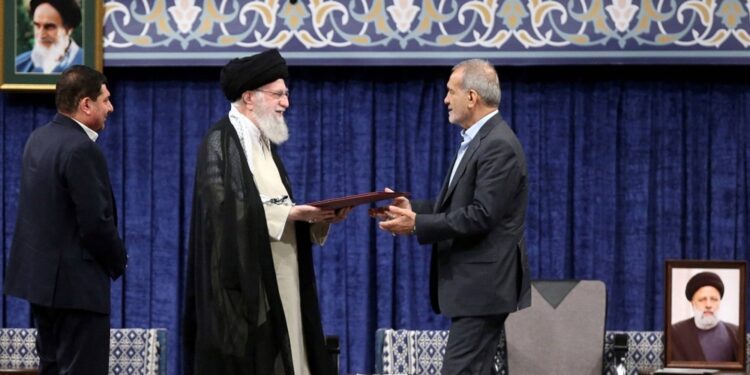Iran’s Supreme Leader Ayatollah Ali Khamenei officially endorsed Massoud Pezeshkian as the country’s president during a live broadcast on state television. The endorsement ceremony, held at the Imam Khomeini Hussainiyah in Tehran, was attended by senior Iranian and foreign officials. Pezeshkian’s presidency marks a crucial period in Iranian politics, given the nation’s ongoing regional and international challenges.
Khamenei’s Endorsement and Anti-Israel Stance
During the ceremonial event, Khamenei handed Pezeshkian an official validation edict, signifying his induction into office for a four-year term. In his address to the nation, Khamenei reaffirmed Iran’s unwavering opposition to Israel, referring to it as a “criminal gang” and a “terrorist band.” He praised Hamas for its actions in Gaza, underscoring Iran’s persistent anti-Israel stance.

Criticism of European Nations
Khamenei also criticized European countries for their “bad behavior” towards Iran, highlighting sanctions, an oil embargo, and allegations of human rights abuses. He condemned these actions as unjust and detrimental, asserting that they reflect a biased and adversarial approach against Iran.
Pezeshkian’s Promises and Moderate Stance
Pezeshkian, known for his moderate stance, reiterated his commitment to a “constructive and efficient” foreign policy. He pledged to bolster the rule of law, provide equal opportunities to citizens, support families, and protect the environment. His presidency comes at a pivotal moment, with heightened tensions in the Middle East, especially concerning the Israel-Hamas conflict and issues surrounding Hezbollah in Lebanon.
Potential for Thawing Relations with the West
Despite the change in presidency, significant shifts in Iran’s regional policies, particularly its support for militia groups like Hezbollah, are not expected. However, Pezeshkian’s moderate and pragmatic approach suggests a potential for thawing relations with Western nations and easing the nuclear standoff with global powers. His willingness to engage in constructive dialogue and seek diplomatic solutions could reduce tensions and open avenues for renewed negotiations on Iran’s nuclear program.
Economic and Diplomatic Implications
Pezeshkian’s presidency might improve Iran’s economic conditions by potentially leading to the lifting of some international sanctions. This could foster a more cooperative international environment. Nevertheless, Khamenei retains ultimate control over critical state policies, including foreign and nuclear policies, which means any significant policy changes remain uncertain.
Constraints of Khamenei’s Authority
Despite Pezeshkian’s moderate and pragmatic approach, Khamenei’s authority over the Revolutionary Guards and key strategic decisions limits the likelihood of major policy shifts. Khamenei’s longstanding hardline stance on Iran’s nuclear ambitions and its role in regional conflicts may restrict Pezeshkian’s ability to implement significant reforms.
Potential for Diplomatic Engagement
While Pezeshkian’s presidency brings hope for diplomatic engagement and improved international relations, the overarching influence of Khamenei may restrain transformative changes in Iran’s foreign policy and nuclear negotiations. Nonetheless, Pezeshkian’s moderate stance could signal a thaw in relations with the West and an easing of the nuclear standoff.
Strengthening Bilateral Relations
Highlighting the importance of international diplomacy, Pakistan’s Prime Minister Shahbaz Sharif is scheduled to visit Tehran to attend Pezeshkian’s inauguration ceremony. This visit underscores the commitment of both countries to strengthen leadership engagement and bilateral relations.
Massoud Pezeshkian’s endorsement as Iran’s president by Ayatollah Khamenei marks a significant moment in Iranian politics. While Pezeshkian’s moderate approach offers hope for diplomatic engagement and improved international relations, the overarching influence of Khamenei poses constraints on significant policy changes. The future of Iran’s domestic and foreign policy will depend on the interplay between Pezeshkian’s moderate vision and Khamenei’s authoritative stance.
Related stories:
US Not Expecting Policy Change from Iran Under New President
Iran’s New President Vows More Freedom, Improved Western Relations
















